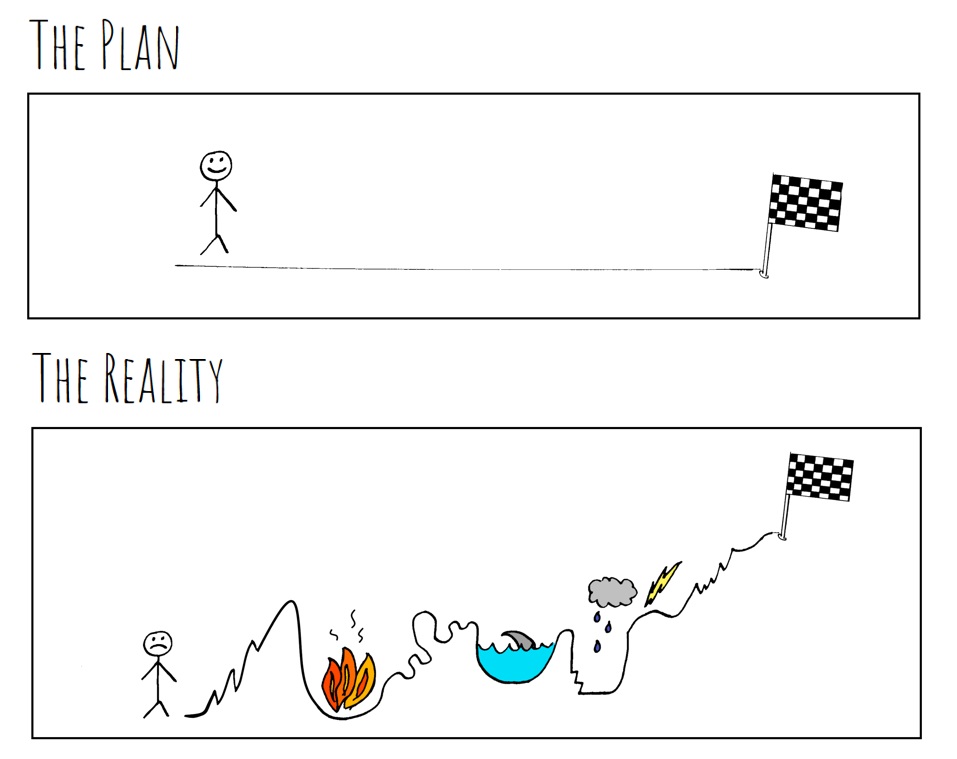We all know that having a plan is a sensible idea when you work for yourself. It’s the proactive thing to do.

Whether it’s a plan for the overall strategy of the business, a plan for your marketing or a plan for your blogging.
The point is to break down those big goals we set for ourselves into baby steps. Actions we can take on a daily, weekly, monthly, quarterly, yearly basis.
Yet, so often we’re resistant to the confines of a ‘plan’ – after all, nothing ever goes according to plan, right? So, what’s the point of having one?

Without a plan, you are trapped in the endless cycle of reacting to challenges. Instead of making positive strides towards what you really want to be doing with your time.
You need at least some vague plan, otherwise, how will you know where you are going and when you’ve arrived?
What proactive steps do you take if you don’t know which direction to take them in?
There is always so much to do when we work for ourselves. There are never enough hours in the day. So, it’s up to you to decide how best to use those precious hours…
The most common myth for not blogging is not having the time.
I say it’s a myth, because, “I don’t have time” can be applied to absolutely any activity…
“I don’t have time to go to the gym”
“I don’t have time to prepare a sensible meal”
“I don’t have time to update my website”
“I don’t have time to go on holiday”
“I don’t have time to (fill in the blank)”
Unless you prioritise something, how will you make the time to do it? And if you are not proactive enough to have a plan, how will you find that time?
There is so much information out there on managing our time effectively.
My friend, and the brilliant transformative coach, Sarah Clark of Mariposa Coaching, has shared 8 Time Management Strategies HERE.
We had a little Twitter chat about it, but the first tip she offers resonated with me.
To Quote:
“1) Make a plan for the week prioritised against goals
We all hear about planning using to do lists right? You can’t think about time management without being aware that a to do list is crucial to make baby steps towards your goals.
The key is to link your to do list to longer term goals that you want to achieve.
Think about how you might feel in ten years time from now, looking back on what makes those last ten years productive and happy?
What would you be doing each week to take small steps to move towards this?
It would of course involve breaking goals down into smaller steps but having this mindset can help us see the bigger picture and keep motivated.
It is important to ensure that they are the goals that you want to achieve and not someone elses and that you prioritise your week against these goals.”
Sarah’s blog is just one great piece of content on the topic.
This is my take on a technique you could try, to be more proactive, so you can make the time you need to write your blog.
The Sunday Reboot
This has become something of a ritual for me.
Sunday afternoons, I’ll spend a while thinking about the week I’ve just had and my week ahead. Sunday is my day of the week to reflect on the previous week and prepare myself physically and psychologically for what’s coming up next week.
I can plan in some enjoyable activities, as well as my priorities, to create better balance – after all, one of the main reasons to be self-employed is to have a better work/life balance!
Your life is your work, rather than work becoming your life!
On my Sunday reboot, I ask myself:
What do I want to achieve?
What can I realistically achieve in the space of a working week (i.e. 5 days)?
Is there one BIG thing that would be great to nail this week?
Is there a BIG thing I want to finish this month that I need make progress on?
Are there things I’m NOT prepared to do this week?
Is there something that HAS to happen this week?
The ‘To Do’ list is endless, aiming to clear it in a week is simply unrealistic – what’s on the list that CAN get finished this week?
Break down a big item on the To Do list into smaller tasks
Are there any partial tasks I can do? i.e. rather than having ‘finish the Blogging Book’ on the agenda, have ‘complete the next chapter of the Blogging Book,’ instead
What is coming up in the next few weeks I need to prepare for? Are there any tasks for the list there?
Choose 5 things from the list and allocate a day for each. This can be something you WILL do today, and anything else you do after it is a bonus!

Next, I write the tasks in my diary or day book.
Every day I tick off tasks as I complete them, but I also have a daily ‘done list’.
In my ‘Day to View diary’ I write everything I do in a day and tick it off as a ‘done list’ – that way, even if I don’t do all the things on my list for the week I can see how I’ve been proactive instead.
This helps me to see how much I can do in a day so that for next Sunday’s reboot I have a better sense of what ‘realistic’ actually means!
It also allows me to celebrate all the little wins in my week!

As I look ahead beyond the next week, into the next month, I plan in the occasional ‘Retreat Day‘.
These are days where I knuckle down and focus on one big task for the day – usually banking lots of raw written content for blogs, marketing, products etc.
I make time to write, and I honour it. I’ll do some sort of proactive ‘writing-related activity’ every day. And make sure I add it to the done list!
A Proactive ‘Writing Related Activity’ could be:
Thinking about ideas
Researching ideas
Consuming and curating other content to inform my ideas and research
Planning blogs and other writing
Drafting written content in notebooks and capturing ideas
Setting up blogs in WordPress and drafting ideas
Going into old drafts and adding to them or updating them
Editing old or draft content
Completing drafts and publishing or scheduling them
Regularly rebooting on a Sunday – it may be a different day for you, depending on how your working week is structured – quickly becomes a habit. That habit then becomes a ritual.
Starting the week fresh, with a clear idea of what I need to do, stops me procrastinating and helps me to focus.
I don’t think of this approach as a ‘plan’ – I think of it as being proactive.
I celebrate the little successes and I don’t beat myself up for not doing ‘enough’, because I’ve set myself some sensible baby steps from the outset.

